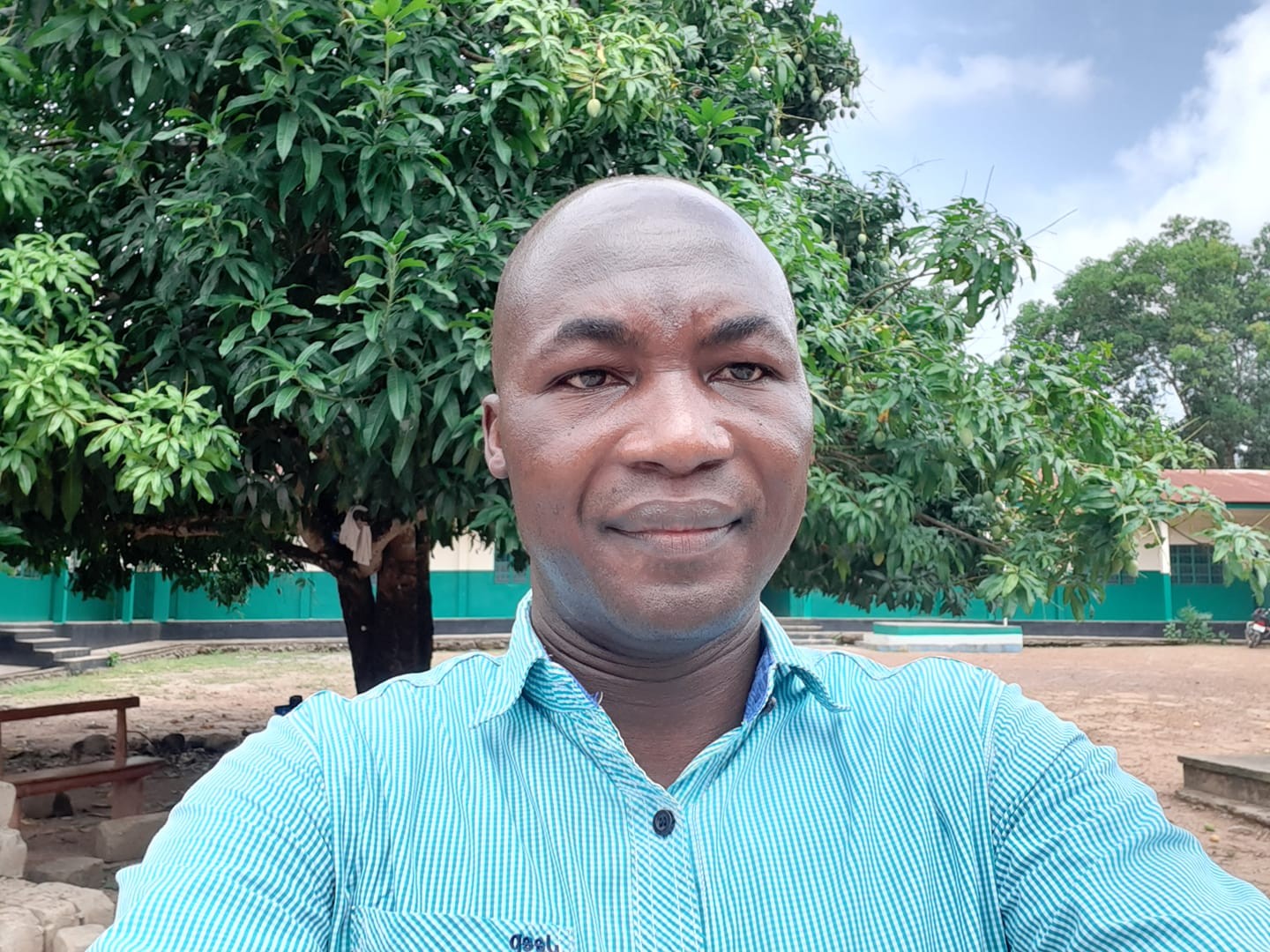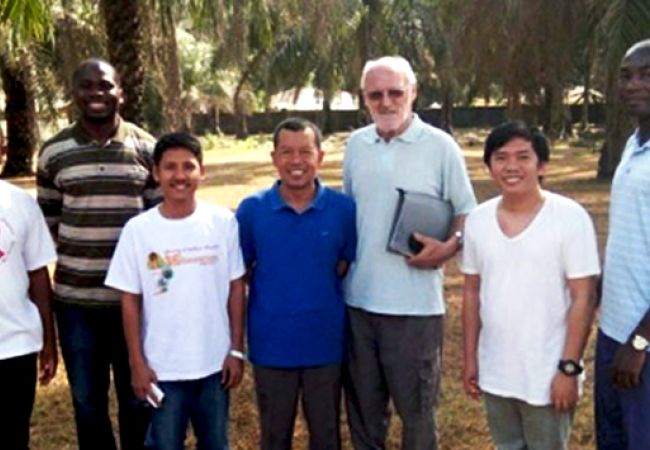My gratitude for having attended the Continental Ongoing Formation in R.D. Congo (1st to 15th august 2021)
“Gratitude is pausing to notice and appreciate the things that we often take for granted (…). It’s taking a moment to reflect on how fortunate we are when something good happens – whether it’s a small thing or a big thing.”[1] Thus I would like to express my deepest gratitude towards our General Direction for having put in their agenda this continental ongoing formation. Truly, I longed for that day when I was told that there would be an ongoing formation for young confreres who were on mission in Africa. Kinshasa being its locus, added zest on my yearning.

In fact, I did my novitiate in Kinshasa in 2008-2009. Thus, returning to where I did my first religious profession was a blessing for me. My sharing will be based on four elements: the necessity of ongoing formation, the sense of belonging to our Xaverian Family, the question of Divine providence, and interreligious dialogue.
1. The Necessity of Ongoing Formation
“Our fidelity to the Kingdom of God, to humanity and the mission, calls us to an ongoing spiritual renewal, to perfect ourselves in the contents and methods of the apostolate.”[2] Aware of this, The XVII General Chapter gave a special attention to Ongoing Formation[3]. And we are happy that the General Direction is implementing it. Knowing the necessity of Ongoing Formation, the General Direction offered us an opportunity to refresh ourselves after having been on mission for a while.
In fact, one of the speakers, Fr. Jean Claude told us that without ongoing formation, missionary life might become a perpetual frustration. Indeed, we don’t want to be frustrated missionaries. To be with Jesus is to be joyful[4]. Therefore, our ongoing formation has been very relevant. It has been a moment of fraternity, human, spiritual and intellectual growth.
2. Sense of Belonging to Our Xaverian Family
Mgr Felicien Ntambue, CICM, the Bishop of Kabinda Diocese (R.D. Congo), reminded us in his intervention that our belonging to our religious family have to be total. By virtue of the wows we professed, we totally belong to the congregation. Thus, we have to love our religious family by being at its disposal. In fact, the congregation does not belong to us in the sense we ought not to use the congregation in order to fulfil our personal desires.
Undoubtedly, what can make our Xaverian Family strong is the sense of belonging of all its members. And I am convinced that a clear sign of this (belonging) is the intense love for our religious family which we must look upon as a mother[5]. That is why our Superior General, Fr. Fernando Gracia, in his homily at the Solemnity of the Assumption of the Blessed Virgin Mary which concluded our Ongoing Formation (on August 15th, 2021 at the chapel of Centre Théophile Verbist - Mbudi) exhorted us to love our Congregation. He also galvanized us that our Founder Saint Guido Maria Conforti had prayed for each one of us[6]. Caring is the visible expression of our intense love for our religious family to whom we belong. Nothing should be more valuable than our congregation.
3. The question of Divine Providence
Speaking of the Divine Providence, there is always the fear in our hearts regarding the financial future of our Xaverian Family. Yet, Pope Francis exhorts us to embrace the future with hope[7]. And the XVII Chapter reminds us this: “The more we strive to ensure that all our activities are solely for the first Proclamation, the more we have the certainty that we will never lack anything we need for achieving our goal: seek first His Kingdom and His righteousness, and all these things shall be yours as well.”[8]
However, confidence in the Divine Providence does not mean idleness. Our hope in it (Divine Providence) has to lead us to creativity and expertise in managing what we receive from our commitment to spreading the Good News. Like Saint Paul and his collaborators, we should work hard to gain what we need for the spreading of the Gospel (cf. 1Th 3: 7-9).
In addition, transparency is a quality that we must foster if we want our Xaverian Family to grow in term of self-reliance. For hypocrisy or double life can lead us to what happened to Ananias and Sapphira. (cf. Ac5:1-11). Indeed, “God hates hypocrisy”[9]. Also, “There is no partiality with God” (Rm2:11).
4. The interreligious dialogue
In our contemporary world dominated by religious pluralism, interreligious dialogue is unavoidable if we want peace. According to Fr. Paulin Batahirwa, dialogue can mean constructive commitment between believers of different religions. Therefore, we need to embrace the values of dialogue which are humility, hospitality, and creativity.
Moreover, we need to contemplate the icons of dialogue in order to gain inspiration. Here they are: Abraham (cf. Gn18:8), Tobit (cf. Tb12:15), Emmaus’ disciples (Lk24: 18-24), Saint Francis of Assisi and his meeting with the Sultan of Egypt etc.
In conclusion, my longing for that ongoing formation was not vain. We learnt a lot and we shared a lot too. I wish the General Direction could organize continental ongoing formation biannually. Once more, I thank the General Direction for this great initiative.
Fr. Martin Ali keke Ndemsou, sx
[1] Mary L. Gavin, MD, « Gratitude » in https://kidshealth.org/en/teens/gratitude.html, consulted on August 30, 2021
[2] C.72
[3] Cf. XVII General Chapter, n°3
[4] Cf. Courtney Mares, “Pope Francis, “Nostalgia is the ‘siren song of religious life’” in Pope Francis: Nostalgia is the 'siren song of religious life' (catholicnewsagency.com) , consulted on August 23, 2021.
[5]Cf. Conforti Anthology, n°16, §4
[6] Cf. Testament Letter, n°11
[7] Pope Francis, “To all consecrated people. On the occasion of the year of consecrated life” in Vatican.va, consulted on August 23, 2021
[8] XVII Chapter, n°80.
[9] Jack Xavada, “God struck Ananias and Sapphira dead for hypocrisy” in https://www.learnreligions.com/, consulted on August 23, 2021
Ma gratitude d'avoir assiste a la Formation Permanente Continentale en R.D. Congo (1-15 août 2021)
« La gratitude, c'est s'arrêter pour voir et apprécier les choses que nous tenons souvent pour acquises (…). C’est prendre un moment pour reconnaitre combien nous sommes chanceux pour quelque chose de bon qui nous arrive, qu’il soit petit ou grand. » Ainsi, je voudrais exprimer ma plus profonde gratitude envers notre Direction Générale pour avoir inscrit à leur agenda cette formation permanente continentale. Vraiment, j'attendais avec impatience ce jour où l'on m'annonçait qu'il y aurait une formation permanente pour les jeunes confrères qui étaient en mission en Afrique. Kinshasa étant lieu de cette formation, cela a renforcé en moi ce grand désir.
En effet, j'ai fait mon noviciat à Kinshasa en 2008-2009. Ainsi, retourner là où j'ai fait ma première profession religieuse a été une bénédiction pour moi.
Mon partage s'articulera autour de quatre éléments : la nécessité de la formation permanente, le sentiment d'appartenance à notre Famille Xavérienne, la question de la Providence divine et le dialogue interreligieux.
1. La nécessité de la formation permanente
« Notre fidélité au règne, à l'homme et à la mission, nous demande de nous renouveler continuellement dans l’esprit, de nous qualifier dans les contenus et les méthodes de l'apostolat » (Const. 72). Conscient de cela, le XVIIe Chapitre Général a accordé une attention particulière à la Formation permanente. Et nous sommes heureux que la Direction Générale la tienne au cœur. Consciente de la nécessité de la Formation Permanente, la Direction Générale nous a offert l'opportunité de nous ressourcer après un temps passé en mission.
Un des intervenants, le P. Jean Claude Nkanku, CICM, nous a dit que : « Sans la formation permanente, la vie devient une frustration permanente ». En effet, nous ne voulons pas être des missionnaires frustrés. Être avec Jésus, c'est être joyeux. Par conséquent, notre formation permanente a été très importante. Ce fut un moment de fraternité, de croissance humaine, spirituelle et intellectuelle.
2. Sentiment d'appartenance à notre famille xavérienne
Mgr Félicien Ntambue, CICM, Evêque du Diocèse de Kabinda (R.D. Congo), nous a rappelé dans son intervention que notre appartenance à notre famille religieuse doit être totale. En vertu des vœux que nous avons professés, nous appartenons totalement à la Congrégation. Nous devons donc aimer notre famille religieuse en étant totalement à sa disposition. En fait, la Congrégation ne nous appartient pas dans le sens où nous ne devrions pas l’utiliser pour satisfaire nos désirs personnels.
Sans aucun doute, ce qui constitue la force de notre Famille Xavérienne, c'est le sentiment d'appartenance de tous ses membres. Et je suis convaincu qu'un signe clair de cette appartenance est l'amour intense pour notre famille religieuse que nous devons considérer comme une mère. C'est pourquoi notre Supérieur Général, le P. Fernando Gracia, dans son homélie de la Solennité de l'Assomption de la Bienheureuse Vierge Marie qui a conclu notre Formation Permanente (le 15 août 2021 à la chapelle du Centre Théophile Verbist - Mbudi), nous a exhortés à aimer notre Congrégation. Il nous a également encouragés par le fait que notre Fondateur Saint Guido Maria Conforti avait prié pour chacun de nous. L’attention est l'expression visible de notre amour intense pour notre famille religieuse à laquelle nous appartenons. Rien ne devrait avoir plus de valeur que notre Congrégation.
3. La question de la Divine Providence
En parlant de la Divine Providence, il y a toujours la peur dans nos cœurs concernant l'avenir financier de notre Famille Xavérienne. Pourtant, le Pape François nous exhorte à embrasser l'avenir avec espérance. Et le XVIIe Chapitre Général nous le rappelle : « Plus nous nous engageons à diriger toutes nos activités seulement vers la première annonce, plus nous avons la certitude que rien ne pourra nous manquer pour atteindre notre objectif : cherchez premièrement le royaume et sa justice, et tout cela vous sera donné en plus » (XVII CG 80).
Cependant, la confiance en la Divine Providence ne veut pas dire paresse. Notre espérance en elle (la Divine Providence) doit nous conduire à la créativité et à l'expertise dans la gestion de ce que nous recevons de notre engagement dans la diffusion de la Bonne Nouvelle. Comme saint Paul et ses collaborateurs, nous devons travailler dur pour obtenir ce dont nous avons besoin pour la diffusion de l'Évangile (cf. 1Tim 3, 7-9).
De plus, la transparence est une qualité que nous devons favoriser si nous voulons que notre Famille Xavérienne grandisse du point de vue de l'autonomie. Car l'hypocrisie ou la double vie peuvent nous conduire à ce qui est arrivé à Ananie et Saphira. (cfr. Act. 5 :1-11). En effet, « Dieu déteste l'hypocrisie ». Aussi, « Car Dieu est impartial » (Rm 2,11).
4. Le dialogue interreligieux
Dans notre monde contemporain dominé par le pluralisme religieux, le dialogue interreligieux est incontournable si nous voulons la paix. Selon le P. Paulin Batairwa, le dialogue peut signifier un engagement constructif entre croyants de différentes religions. Par conséquent, nous devons adopter les valeurs du dialogue qui sont l'humilité, l'hospitalité et la créativité.
En plus, il faut contempler les exemples du dialogue pour s'en inspirer. Les voici : Abraham (cf. Gn18,8), Tobie (cf. Tb12,15), les disciples d'Emmaüs (Lc 24,18-24), Saint François d'Assise et sa rencontre avec le Sultan d'Egypte etc.
En conclusion, mon désir pour cette formation permanente n’était sans valeur. Nous avons beaucoup appris et partagé ensemble. Je souhaite que la Direction Générale continue à organiser la formation permanente continentale chaque deux ans. Encore une fois je remercie la Direction Générale pour cette grande initiative.
P. Martin Ali keke Ndemsou, sx
Link &
Download
Accedi qui con il tuo nome utente e password per visualizzare e scaricare i file riservati.





